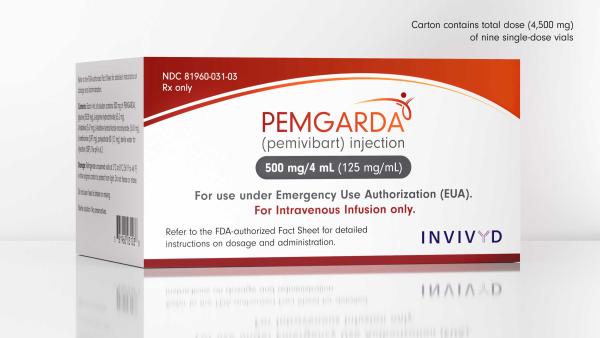The US Food and Drug Administration (FDA) has issued an emergency use authorization (EUA) for a novel COVID-19 prevention medication targeted at patients who may not mount an effective immune response to vaccines.
Developed by Invivyd, Inc., a pharmaceutical company based in Massachusetts, the drug named Pemgarda (pemivibart) has been greenlit for use in individuals aged 12 and above, weighing at least 88 lbs (40 kg).
Pemgarda, previously referred to as VYD222, is tailored for individuals facing moderate to severe immune suppression due to specific medical conditions or treatments, rendering them unlikely to generate an adequate immune response to COVID-19 vaccines. This includes patients with blood cancers and solid organ transplant recipients.
Distinguished as the first pre-exposure prophylaxis monoclonal antibody (mAb) to receive an EUA from the FDA, Pemgarda’s approval is based on a pioneering, rapid, and replicable immunobridging trial design.
Invivyd’s CEO, Dave Hering, expressed pride in the swift progress, noting the availability of the product for order within approximately one year of commencing the Phase 1 trial.
Functioning as a monoclonal antibody treatment, Pemgarda acts as a surrogate antibody bolstering the immune system’s ability to combat SARS-CoV-2, the virus responsible for COVID-19.
Recent actions by the FDA revoked EUAs for monoclonal antibody treatments like EVUSHELD and bebtelovimab due to their diminished efficacy against emerging COVID-19 variants.
Despite its promising profile, Pemgarda is not a substitute for vaccination and should not be administered to individuals eligible for vaccination. Patients should wait at least two weeks after vaccination before considering Pemgarda.
The drug is not indicated for treating COVID-19 or preventing the disease following exposure to an infected individual.
Administered via intravenous infusion over approximately 60 minutes, Pemgarda requires patients to be monitored for at least two hours post-infusion.
Common side effects of Pemgarda include allergic and infusion-related reactions, along with symptoms resembling the common cold, viral infections, fatigue, headaches, and nausea.
The FDA underscores potential serious and unforeseen side effects, emphasizing ongoing studies to comprehend all associated risks fully. Notably, four out of 623 participants in the trial experienced anaphylaxis, a severe allergic reaction. Individuals exhibiting allergy symptoms post-Pemgarda infusion should seek immediate medical attention.
Given that approximately 3% of American adults are immunocompromised, rendering them less capable of combatting SARS-CoV-2, Pemgarda offers a glimmer of hope in enhancing protection against COVID-19.
The authorization letter can be assessed here.
